
The black-winged little yellow bat is a species of vesper bat native to Central America.
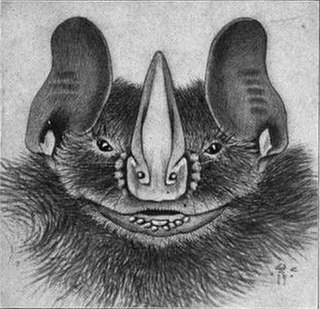
The silver fruit-eating bat is a South American bat species of the family Phyllostomidae.
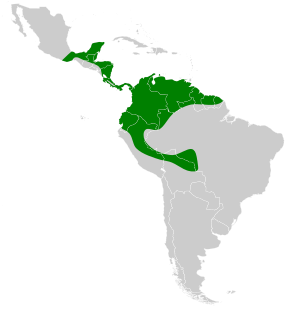
The northern little yellow-eared bat is a bat species found from southern Mexico to Bolivia, the Guianas and western Brazil.

The bidentate yellow-eared bat is a species of bat in the family Phyllostomidae, native to South America. Formerly classified in the Vampyressa genus, phylogenetic analyses support its inclusion in Vampyriscus.
The Gobi big brown bat is a species of vesper bat. It is found in Afghanistan, China, India, Mongolia, Pakistan, and Russia. Russian zoologist Professor Count Nikolay Alekseyevich Bobrinski first described it in 1926, the type specimen coming from the Altai Mountains in the Gobi Desert.

Genoways's yellow bat is a species of vesper bat found only in Mexico. It is threatened by habitat loss. Due to its imperiled status, it is identified by the Alliance for Zero Extinction as a species in danger of imminent extinction.

The insular mole is a species of mammal in the family Talpidae. It is restricted to Hainan Island and Taiwan, where it is also known as the Formosan blind mole. The species was first described by Robert Swinhoe in 1863.
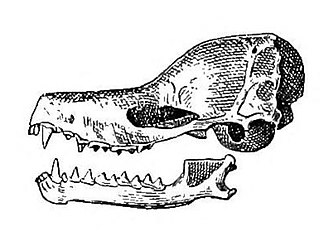
Gervais's funnel-eared bat is a species of bat in the family Natalidae. It is the only species within the genus Nyctiellus. It is found in Bahamas and Cuba.

Pteropus pelagicus is a species of fruit bat in the family Pteropodidae. It includes two subspecies that were formerly recognized as full species— Pteropus insularis and Pteropus phaeocephalus. It is endemic to Micronesia. It is threatened by habitat loss.
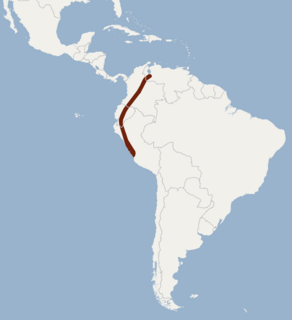
The Bogotá yellow-shouldered bat is a species of bat in the family Phyllostomidae. It is found in Colombia, Ecuador, Peru, and Venezuela at altitudes from 300 m to above 2000 m, particularly in cloud forest. The species is primarily frugivorous; it may also consume nectar and pollen.
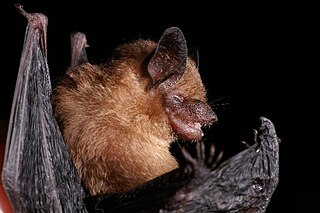
Rhogeessa is a genus of bats within the vesper bats family, Vespertilionidae.
The Cuban evening bat is a species of bat in the vesper bat family, Vespertilionidae, that is endemic to western Cuba. It is a small bat, even smaller than cogener Nycticeius humeralis. It is insectivorous, but otherwise little is known about its behavior and diet.
Pfeiffer's red bat is a species of bat from the family Vespertilioninae and is endemic to Cuba. It is listed as Near Threatened by the IUCN Red List due to a significant population decline, caused by human population density on its endemic island, habitat conversion, and hurricanes. The species is likely insectivorous; fecal matter samples from a single bat contained only beetles. It may be a subspecies of the Seminole bat.
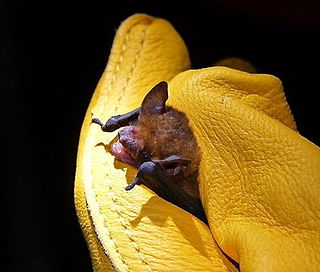
Thomas's yellow bat is a species of bat from the family Vespertilionidae.
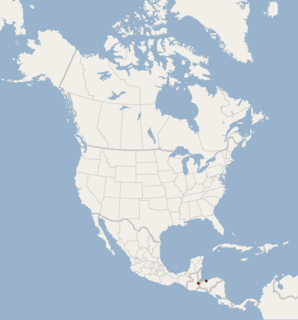
Menchu's little yellow bat is a species of vesper bat found in Central America. It was described as a new species in 2012.
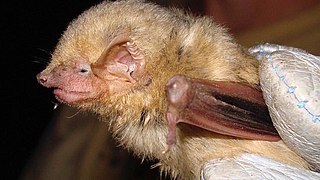
Dasypterus is a genus of or subgenus of vesper bat. As a genus, it includes species that were formerly in the genus Lasiurus. Collectively, members of Dasypterus are referred to as the yellow bats.













